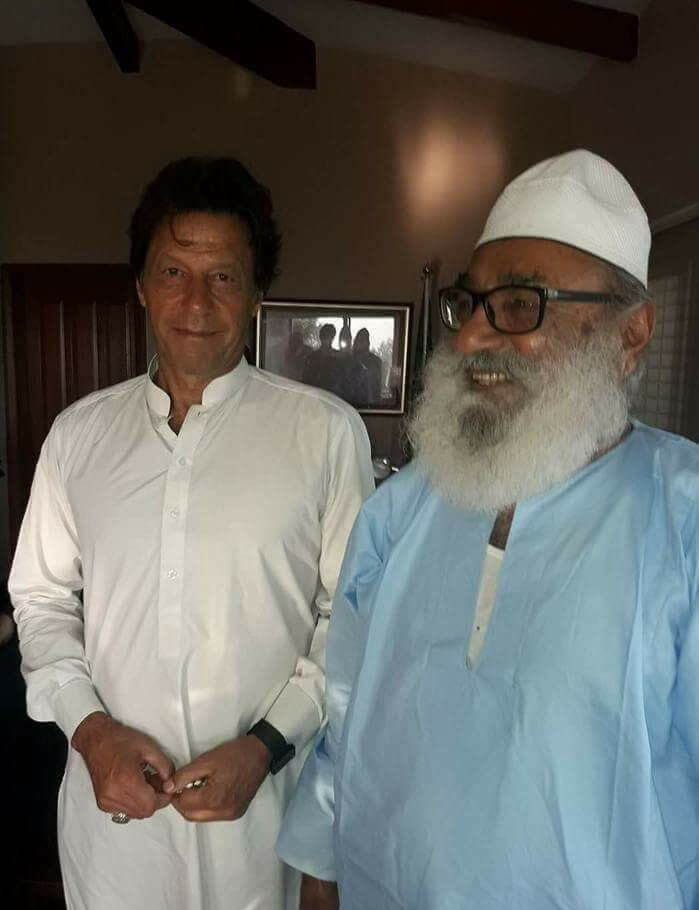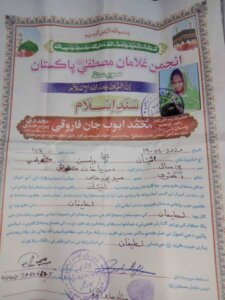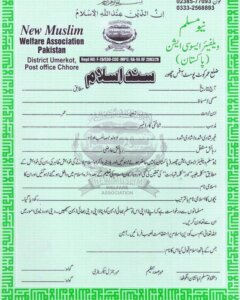
Forced Conversions and the Barriers to Education for Minority Girls
What makes “Conversions” dubious about “Consent” in Pakistan?
Let’s delve into the reasons for controversy over conversions of girls (age not determined by law) belonging to a religious minority community:
 Exhibit 1 is what we commonly know as a “sanad” or a religious certificate of conversion. This piece of paper is issued by the registered religious organization where the girl or the boy is said to have converted. This is the certificate of a newly converted girl named Anita Ramsin from Dhagri in Mirpur Khas District. Her new Muslim name is now Lateefa. This certificate has been issued by Anjuman e Ghulaman e Mustafa Pakistan, a Muslim religious (welfare) organization working in an area where Hindu population is significant.
Exhibit 1 is what we commonly know as a “sanad” or a religious certificate of conversion. This piece of paper is issued by the registered religious organization where the girl or the boy is said to have converted. This is the certificate of a newly converted girl named Anita Ramsin from Dhagri in Mirpur Khas District. Her new Muslim name is now Lateefa. This certificate has been issued by Anjuman e Ghulaman e Mustafa Pakistan, a Muslim religious (welfare) organization working in an area where Hindu population is significant.

Exhibit 2 is a certificate which is issued by New Muslim Welfare Association working in Chhore in District Umer Kot. It also carries the basic information as the name of the person, age, and family. This organization is a registered trust that is also working to provide “welfare” to an area where Hindu population is significant.
Like in case of all other certificates that need scrutiny and attestation by authorities, this sanad doesn’t require any, and can be presented as the sole “proof” of conversion in any court of law. Furthermore, these certificates can get issued by any organization and the whole process is carried out without any official scrutiny by authorities to ensure that the conversion has indeed taken place out of free-will.
A conversion from one religion to Islam is no ordinary matter in Pakistan, especially in a situation where religious conversions of young girls and children are widely suspected to be forced. We must not forget that once the declaration of faith, that is when the Kalma, has been recited, the majority of clerics hold that the reversion is considered a grave sin and the person, minor or not, would be deemed a “murtid” or an apostate who is liable to strict religious punishments, such as death. This is why a prominent human rights activist, Ms. Pushpa Kumari calls it a “One-way street”. It is a grave social risk, especially where religiously inspired mob attacks are increasingly becoming common. Victims of forced conversions, especially girls, cannot revert back to their original religion and are not fully accepted back into their community. In other words, the life of the victim of a forced conversion is destroyed.
If we take an example of faith conversions in Sindh, there is no regulation of an ever increasing number of Islamic welfare organizations in Hindu-significant areas where they have taken upon themselves to “convert” Hindus. This makes their very presence and purpose questionable because the socio-economic conditions of the Hindu communities in their areas of “welfare” interventions remain unchanged and stagnant . If their provision of “welfare” services is conditional to their conversion, then, the question of the fundamental right of “freedom of religion” becomes crucial.
In light of many failures at an attempt to legislate on this grave issue, we need to keep pointing fingers at a complete lack of mechanism to scrutinize matters of conversions in a situation where minority communities are pleading with the state to provide their daughters safeguards against forced marriages and the inevitable pedophilia if the abducted bride is a minor. In a situation where there is no legal oversight of the process of conversion, or that the “welfare organizations” have a free hand in “converting”, it does not make it safe for us to assume that there are no forced conversions happening there.
Pakistan and its commitments to Freedom of Religion
Pakistan is one of the earliest signatories of the Universal Declaration of Human Rights, which carries a set of principles for human rights to which its partner countries comply. On the issue of religious freedom, the declaration states in Article 18 that:
“Everyone has the right to freedom of thought, conscience and religion; this right includes freedom to change his religion or belief.”
Pakistan also ratified the International Covenant on Civil and Political Rights to which it is bound to comply.
The article 18 of ICCPR comprises of 4 parts, first two of which carry the freedom of religion principles, and the freedom to convert. They are as follows:
- “Everyone shall have the right to freedom of thought, conscience and religion. This right shall include freedom to have or to adopt a religion or belief of his choice, and freedom, either individually or in community with others and in public or private, to manifest his religion or belief in worship, observance, practice and teaching.”
- “No one shall be subject to coercion which would impair his freedom to have or to adopt a religion or belief of his choice.”
- “Freedom to manifest one’s religion or beliefs may be subject only to such limitations as are prescribed by law and are necessary to protect public safety, order, health, or morals or the fundamental rights and freedoms of others.”
- “The States Parties to the present Covenant undertake to have respect for the liberty of parents and, when applicable, legal guardians to ensure the religious and moral education of their children in conformity with their own convictions.”
In further explanation to the said article, a General Comment 22 was included which clarified that the said article stresses the right to change religion and prohibits any coercion that would impair this right, including the use of threat of physical force or penal sanctions to compel believers or non-believers to adhere to their religious beliefs and congregations, to recant their religion or belief or to convert. It also bans the restriction of education, medical care, employment, or other human rights in order to induce a conversion.
In his quest to further explore what constitutes forced conversion, Professor Heiner Bielefeldt, the former UN Special Rapporteur for Freedom of Religion or Belief (FoRB), presented at least four subcategories of the right to conversion need to be considered:
- the right to conversion (in the sense of changing one’s own religion or belief);
- the right not to be forced to convert.
- the right to try to convert others by means of non-coercive persuasion; and
- the rights of the child and of his or her parents in this regard.
Why should a “Forced Conversion” be considered a grave Human Rights Crime?
Many families, their lawyers and human rights watchdogs report of cases where minor girls are abducted, married and forced to convert to Islam to solemnize the marriages in question with their abductors. In some cases, even when victims find some relief and return to their families, they cannot, under religious conditions, revert back to their old belief. This raise concerns over “freedoms” to choose religion. Issue of minors being forcefully converted to another religion has also been acknowledged by the state itself. In November 2019, a Parliamentary Committee on Protection of Minorities against Forced Conversions was set up to record such incidents.
Attempts were made to ban forced conversions for underage girls in 2016 and again in 2019 in Sindh and later in the National Assembly, but they failed to proceed due to religious objections raised by the right-wing clerics. Recently the Ministry of Human Rights itself prepared a draft legislation based on the recommendations of the parliamentary committee, but that too could not move forward due to extreme opposition to the idea of raising the age of consent for girls to 18. Moreover, in recent weeks, Prime Minister Imran Khan himself reassured the clergy that no legislation would take place under his tenure that they’d find offensive to their rigid beliefs. This brings everyone’s efforts, including those of the Ministry of Human Rights, back to square one, where the plight of the minority communities, especially in terms of protection of their girls, remains an unachievable task.
Education Barriers and Insecurities caused by Incidents of Religious Conversions
The effects of conversions are tremendous. They heavily dent other fundamental rights which the government is bound to ensure to every citizen, One such right that gets affected is of education. With the age of the girl-child not uniformly defined across Pakistan, many girls remain deprived of certain protections reserved for children. The consequence of abductions and forced conversion of young girls is also the fear that the families develop of sending their girls to schools. Access to education for them is not just denied (by perpetrators), but is also refused by the persecuted communities.
The social pressures and discrimination faced by minority communities often make them less expressive about rights violations, unlike majority communities. There is a fear of backlash from the rightwing.
Anecdotal evidence suggests that minority girls who are enrolled at schools, persistently face school and peer pressure to convert to Islam. Due to fear of losing their school education owing to harassment, many minority girls refrain from informing parents about their rights violation. A lack of counter strategy to incidents of harassment ends up encouraging an environment where abusers feel stronger. To understand the exact situation, there is no way of knowing the ratio of school dropouts of minority girls, as this concern remains largely ignored by many stakeholders in policy or law-making processes. Furthermore, the girls who are lucky enough to escape their captivity find further abandonment because of their inability to make their way back into their communities. Due to a lack of education or other means to earn a living, they further become extremely vulnerable to all sorts economic and social exploitation. Their dire situation calls for the rehabilitation work that not only addresses their health and sustenance needs, but also empowers them with the skills and vocational training so they may restore their confidence and dignity in this society.
So What Needs to be Done?
There is a lot that needs to be done to protect our women, and especially our girl-children who fall easy prey to sexual crimes in the name of “conversion” and marriages for which there is no guarantee of ensuring free-will and consent. Many people belonging to the right-wing here condemn any call or attempt for reforms in the legislative system to protect our children from exploitation . In fact, they admonish the politicians, advocates, journalists and activists as the ones working on some “western agenda”, whereas the truth of the matter is thatthe problem of forced conversion is happening to our own people, the fellow citizens we call “minorities”. The same who otherwise had a right to be called as our equal citizens but, the contradictions within the constitution and the applicable laws have technically alienated them from us. The society’s general behavior that is fed with populist and xenophobic slogans to discredit us raising a just voice for them is ruining our social fabric with more divisive onslaughts. The problem needs a strong, deeper understanding of our intrinsic complex scenarios that are fast evolving into something more destructive. It is not a “western agenda” when the people of Pakistan call for a local solution to inspire more solidarity with our persecuted fellow citizens. The least that Pakistan could do here was make the age of the girl-child uniform across all the boards and implement existing laws against “forced marriages” more realistically. At present, a girl aged 16 is legally treated as an adult whereas a boy under 18 is still a child. The parallel Shariah law further complicates the matter where it states that a girl becomes of marriageable age as soon as she hits her puberty. Applications of such laws further contradict and confuse proceedings in the court more complex. The historical and anachronistic notion of child marriages are now being abandoned by many Muslims countries themselves , as they are no longer tolerated where medical evidence and ethics consider such acts to be dangerous to emotional and physical health of the child.
There is also a need to understand the strong co-relation between the rise in human rights violations against the minorities and the towering rise in religious institutions since 80’s without due regulations or oversight of the state. The problem is an intrinsic one where the marginalized communities need more protection than they ever did in the past. And this cannot be tackled without a strong resolve of the state and the society in general to protect children, girls along with ensuring their inalienable dignity and the right to exercise choice. It is both a moral and a social responsibility to also recognize girl-children as children, not adult or marriage commodities. Our girl-children need to be in schools getting their education, instead of throwing them into a life where free-consent is not considered and servitude to clergy is considered a “virtue”.



